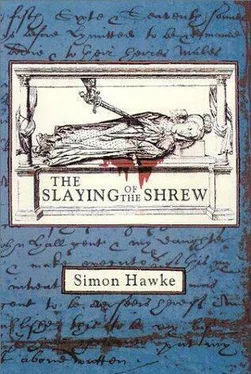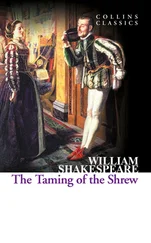Simon Hawke - The Slaying Of The Shrew
Здесь есть возможность читать онлайн «Simon Hawke - The Slaying Of The Shrew» весь текст электронной книги совершенно бесплатно (целиком полную версию без сокращений). В некоторых случаях можно слушать аудио, скачать через торрент в формате fb2 и присутствует краткое содержание. Жанр: Исторический детектив, на английском языке. Описание произведения, (предисловие) а так же отзывы посетителей доступны на портале библиотеки ЛибКат.
- Название:The Slaying Of The Shrew
- Автор:
- Жанр:
- Год:неизвестен
- ISBN:нет данных
- Рейтинг книги:5 / 5. Голосов: 1
-
Избранное:Добавить в избранное
- Отзывы:
-
Ваша оценка:
- 100
- 1
- 2
- 3
- 4
- 5
The Slaying Of The Shrew: краткое содержание, описание и аннотация
Предлагаем к чтению аннотацию, описание, краткое содержание или предисловие (зависит от того, что написал сам автор книги «The Slaying Of The Shrew»). Если вы не нашли необходимую информацию о книге — напишите в комментариях, мы постараемся отыскать её.
The Slaying Of The Shrew — читать онлайн бесплатно полную книгу (весь текст) целиком
Ниже представлен текст книги, разбитый по страницам. Система сохранения места последней прочитанной страницы, позволяет с удобством читать онлайн бесплатно книгу «The Slaying Of The Shrew», без необходимости каждый раз заново искать на чём Вы остановились. Поставьте закладку, и сможете в любой момент перейти на страницу, на которой закончили чтение.
Интервал:
Закладка:
As Shakespeare followed Hughe Camden back downstairs, he had a feeling that he had left Smythe with his hands full. But then the lad was certainly old enough to be able to take care of himself. And if he couldn’t, well, then Blanche Middleton was doubtless fully capable of taking care of him. What Shakespeare wanted to find out, if he could, was how long Camden had been in the library with Blanche. With any luck, Smythe would be asking Blanche exactly the same thing, so long as he was not distracted by her rather obvious attributes.
It would be nice to know if they both told the same story, and if the details coincided. But at the same time, Shakespeare thought, even if Smythe was distracted by the apparently perpetually randy Blanche Middleton, it might not necessarily prove to be a bad thing. It might get his mind off Elizabeth, if only for a little while. But even a little while could be enough, with any luck, to help effect a cure.
He did not really have anything against Elizabeth, personally. It was just that women were trouble. He knew that only too well. He thought of his Anne, back home in Stratford with the children, doubtless berating him soundly to anyone who would listen, and doubtless considering other likely prospects even as she did so. Not for the first time, he sighed with regret over his foolishness.
He would not forget his obligations. He would continue to send money, though at times, it placed a hardship on him he could ill endure. He did not really need fine clothes or lavish entertainments, and he could always eat a little less if it would allow him to drink a little more. And it was not as if things were not improving. He was certainly doing much better now than when he had first arrived in London. Having Smythe to help share the expenses eased some of the burden for them both, though at least Smythe did not have to support a family that he had never wanted. Although if Tuck did not watch out, he might easily get himself in trouble with young Blanche. But then, given Blanche’s predilections and general lack of discretion, it would doubtless be impossible to fix the blame with any certainty. And from her father’s point of view, any other candidate-except, perhaps, the neighbor’s stableboy-would be a far more suitable scapegoat. No, Smythe was safe enough, thought Shakespeare.
Hughe Camden, on the other hand, would probably like nothing better than to place a bun inside that ready little oven. And even if a loaf was baked from someone else’s dough, he might not object to claim it, for it would ensure a marriage, which in turn would ensure a fortune for him when Blanche’s father died. There were no other heirs, and even if Godfrey Middleton decided to remarry in his dotage and sired a son with a new wife, Blanche’s husband would still find himself in a very comfortable position. Aside from which, a man who had no compunction about killing would certainly not hesitate to dispose of any new young heirs. But what were the chances that Hughe Camden was that man?
They seemed rather remote, thought Shakespeare, as he followed Camden outside to the fairgrounds. Sir William seemed inclined to dismiss Camden as a suspect on the grounds of his pedigree, and on that basis alone, Camden could not be the man Smythe had overheard. That left Andrew Braithwaite and the Frenchman. One of them had to be the killer. But which one?
12
Shakespeare followed Hughe Camden outside and caught up to him as he was crossing the courtyard, heading towards the fairgrounds. By the time the poet fell in step beside him, the barrister had recovered much of his self-possession and gazed at Shakespeare with a look that conveyed both smug superiority and just the right amount of upper-class contempt.
Shakespeare did not find his snooty attitude even remotely unexpected. Camden was, after all, the son of a wealthy knight and he was given enough money that probably his greatest worry was how many times a month he could afford another suit of clothes or a fancy beaver hat, like those worn rakishly by all his colleagues at the Inns of Court. Then, too, as an inner barrister, he doubtless considered himself something of a connoisseur of theatrical productions, for the young gentlemen at the Inns of Court were well known for staging amateur theatricals in their halls for the better class of people, and the poets whose works they would perform were all university men such as Marlowe, Greene and Nashe. The Queen’s Men and their ilk, who performed for the crass groundlings of the public theaters and often staged the very same plays, were looked upon by them as vulgar second-raters.
Camden raised a disdainful eyebrow at the poet, but did not deign to start a conversation. Presumably, thought Shakespeare, one did not speak first to one’s inferiors. Fine, he thought, so be it. He simply smiled at Camden in a warm, comradely sort of way, and kept right on walking beside him, saying nothing. Camden cleared his throat after a moment, as if to prompt him, but Shakespeare merely smiled at him once more. This seemed to infuriate the barrister. His face flushed, the corners of his mouth turned down with scorn, and his aristocratic nostrils flared.
“If you suppose that there was any hint of impropriety in what you have just seen,” said Camden, haughtily, “and that what you believe you may have witnessed has somehow placed you in some position of particular advantage over me, then I can assure you, sir, that you are very much mistaken on both counts.”
“Oh, upon my word, that was well spoken!” Shakespeare said. “You flatter me, sir, to suppose such great complexity of thought to my most ordinary brain. Indeed, I can but scarcely apprehend your meaning. I can but hazard that your remarks just now were in some way concerned with your lying atop the lady in the library… or was it laying? S’trewth, lying, laying, I need my old schoolboy’s hornbook, for I can never keep them straight.”
“Now, see here…”
“Nay, milord, I was not seeking instruction, for doubtless you would know the difference, as you are a fine and educated gentleman of the Inns of Court. Eloquence, indeed, would be your proper province, whereas mine is but some foolish capering and posturing upon the stage. Odd’s blood, what would I know, indeed?”
“Aye, well, not a very great deal, I should think,” said Camden, stuffily.
“Not a great deal at all, I quite agree, I quite agree,” said Shakespeare. “Which is why, of course, I make every effort to learn more and better myself at every opportunity, you see. And I could see, indeed, that back in yonder library, you were but doing what you could to comfort the young lady, who was doubtless overcome in her bereavement, what with the twin tragedies of the deaths of both her sister and her lover.”
“Her lover, did you say?” Camden stopped abruptly, startled, but Shakespeare purposely kept right on walking, as if he had not noticed, forcing the barrister to run several steps in order to catch up.
“Aye, her lover, too, slain so tragically on the very same day that her poor, dear sister was murdered, and not once, it seems, but twice! So in effect, I suppose one might say that there were three murders, save for the fact that there were but two victims.”
“Wait a moment,” Camden said, frowning, “what the devil are you talking about? What do you mean when you say her lover? That is to say, whom do you mean? And who is it that was slain and how? And, for that matter, when)”
“Oh, why, that would be Daniel Holland, I believe,” said Shakespeare.
“ Holland!”
“Aye, indeed, he is the very one.”
“Good God! You mean to say that Holland was her lover?” “Once again, sir, your education speaks, for indeed, ‘twas was, not is, that is the proper form.”
Читать дальшеИнтервал:
Закладка:
Похожие книги на «The Slaying Of The Shrew»
Представляем Вашему вниманию похожие книги на «The Slaying Of The Shrew» списком для выбора. Мы отобрали схожую по названию и смыслу литературу в надежде предоставить читателям больше вариантов отыскать новые, интересные, ещё непрочитанные произведения.
Обсуждение, отзывы о книге «The Slaying Of The Shrew» и просто собственные мнения читателей. Оставьте ваши комментарии, напишите, что Вы думаете о произведении, его смысле или главных героях. Укажите что конкретно понравилось, а что нет, и почему Вы так считаете.












